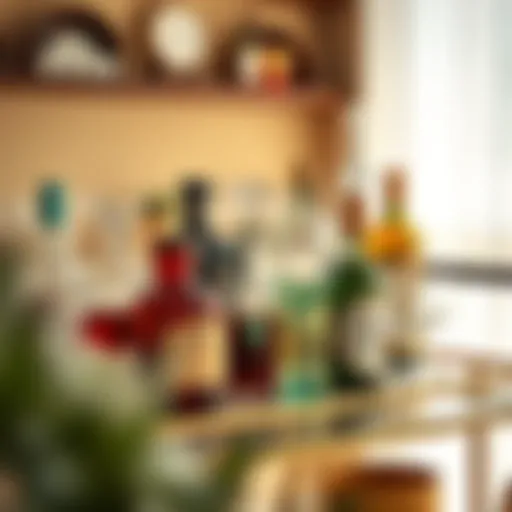The Importance of Choosing Quality French Doors
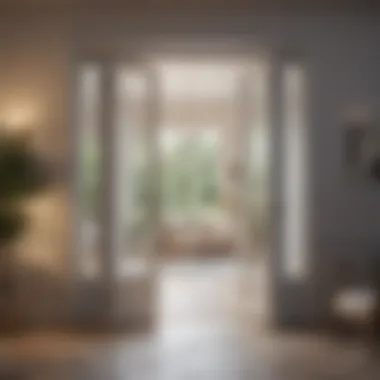

Intro
French doors serve as an elegant transition between interiors and exteriors, creating a unique aesthetic in both modern and traditional homes. The significanc of selecting high-quality versions cannot be overstated. They contribute to the visual appeal of a home and offer practical benefits such as improved natural light and ventilation. Choosing the right French doors involves consideration of design, materials, and functionality. This exploration will guide homeowners and those interested in interior design to appreciate the full potential of French doors. Understanding their importance goes beyond mere aesthetics—it influences property value and living experience.
Design Inspirations
When it comes to design, French doors have evolved to reflect contemporary tastes while honoring their classic roots. They can complement various home styles—from rustic country houses to sleek modern apartments.
Trending Styles
Recent trends focus on minimalism, larger glass panels, and bold frames. These designs enhance the flow of space and connect with the outdoors, allowing more light to enter.
- Classic Wooden Frames: Timeless choice for traditional homes.
- Aluminum Frames: Popular for modern aesthetics, providing durability.
- Bi-fold French Doors: Perfect for creating an open-surface feel with flexibility.
- Sliding Glass Doors: Offer a seamless transition without sacrificing space.
Color Palettes
Color plays a critical role in the overall appeal of French doors. Customization options abound, allowing homeowners to match their doors with the rest of the home. Popular color trends include:
- Neutral Tones: White, gray, or beige for a classic look.
- Bold Colors: Navy blue or forest green can act as statement pieces.
- Natural Wood Finishes: Offers warmth and harmony, popular in eco-conscious designs.
Maintenance and Upkeep
Maintaining French doors is essential for their longevity and performance. Regular upkeep ensures they function properly and remain visually appealing.
Seasonal Maintenance Checklist
- Inspect Weather Stripping: Ensure seals are intact to avoid drafts.
- Check Locks and Hinges: Lubricate for smooth operation and security.
- Clean Glass Panels: Wash periodically to maintain clarity.
- Refinish Wooden Frames: Repair and refinish every few years to protect from the elements.
Cleaning and Organization Tips
Caring for French doors requires thoughtful cleaning techniques:
- Use a soft cloth for glass to prevent streaks.
- A damp cloth with mild soap suffices for wooden surfaces.
- Organize the space around them to avoid damage, particularly if they open inward or outward.
Proper care enhances the beauty and life of your French doors, making them a worthwhile investment for your home.
Prolusion to French Doors
French doors stand as a remarkable architectural feature within homes, synonymous with elegance and functionality. They serve more than just a means of entry or exit; they connect indoor and outdoor spaces, enhancing the overall ambiance of a home. The significance of understanding the various attributes of French doors is pivotal for homeowners and design enthusiasts alike. After all, French doors can impact aesthetics, space perception, and even property value.
The high demand for these doors stems from their versatility. They come in myriad styles and materials, adapting to personal preferences and architectural themes. As one considers the installation of French doors, several factors must be examined. Quality matters greatly; well-crafted doors not only enhance beauty but also ensure durability and efficiency.
The following sections will break down the essentials of what makes a good French door. From their design elements and materials to historical context, a comprehensive exploration lies ahead.
Understanding French Doors
French doors are characterized by their paired door panels, traditionally featuring glass panes. This design invites natural light, creating warmth and a sense of openness. Homeowners appreciate the way they allow views of the outdoors, while also offering a sense of accessibility. Thus, they are often used to open onto patios, gardens, or balconies.
While the aesthetic appeal is evident, there are practical advantages as well. High-quality French doors offer improved insulation and security compared to their lower-quality counterparts. Homeowners must prioritize these features when choosing their doors. Good quality French doors also enable effective transitions between spaces, merging interior design with exterior landscaping effortlessly.
Historical Significance
The roots of French doors trace back to their origins in France during the Renaissance period. As architecture evolved, so did the design of these doors. They were initially made to enhance light and air circulation in homes, reflecting the cultural appreciation for nature and the outdoors. The style grew in popularity and became a hallmark of luxury and sophistication in various architectural movements.
Historically, French doors were often associated with grand estates and opulent homes. However, their unique functional attributes made them beloved by many, regardless of social status. Over the years, this design has seen variations that incorporate modern materials and technology, preserving the essential beauty of traditional French doors while enhancing energy efficiency.
In essence, the historical significance of French doors captures their evolution from an architectural necessity to a contemporary design element. Understanding this timeline helps modern consumers appreciate the value and versatility that high-quality French doors can bring to their homes.
Characteristics of Good Quality French Doors
The choice of French doors is not merely a design preference; it is an investment that impacts the ambiance and functionality of any space. Good quality French doors enhance aesthetic appeal, provide various practical advantages, and significantly affect the overall value of a property. Homeowners and design enthusiasts should carefully consider both the materials and designs when selecting French doors to ensure they complement the architectural style and meet living requirements.
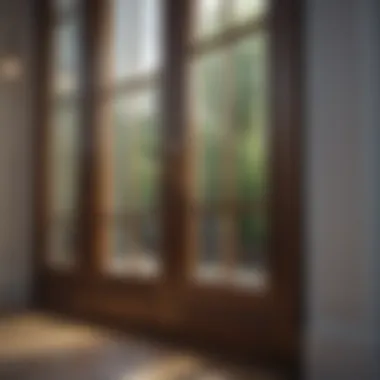

Material Considerations
Wood
Wood is one of the most traditional materials for French doors. Its beauty and intrinsic warmth can elevate the charm of any room. Natural grains and the ability to stain or paint provide homeowners the flexibility to match their decor. However, quality wood doors tend to demand higher upfront costs. Their unique feature lies in durability; with proper maintenance, they can last for decades. However, they are susceptible to rot if they are not treated correctly and can require regular upkeep to maintain their appearance.
Vinyl
Vinyl French doors have gained popularity due to their low maintenance and energy efficiency. Made to withstand the elements, vinyl does not warp or peel over time. One of their key characteristics is the variety of styles and colors available, allowing customization options to fit different tastes. Vinyl doors also provide excellent insulation, contributing positively to energy savings. However, some may find that vinyl lacks the classic charm of wood, which can be a drawback for certain home aesthetics.
Aluminum
Aluminum offers a modern twist to French door design. Known for its strength and durability, aluminum is an ideal choice for homeowners looking for resilience. These doors can be crafted to be very sleek and contemporary, appealing to modern design enthusiasts. However, usually, aluminum does not insulate as effectively as wood or vinyl, which may lead to higher energy costs. The main advantage of aluminum is its resistance to corrosion and minimal upkeep, making it a practical option for busy homeowners.
Fiberglass
Fiberglass French doors are known for their versatility. They can mimic the appearance of wood while being more energy-efficient and resistant to the elements. This material's efficiency contributes to insulation properties, making it a worthy consideration for climates with extreme temperatures. Fiberglass doors come in various textures and colors, allowing for extensive personalization. The disadvantage might include a higher price point compared to other materials.
Design Variations
Traditional
Traditional French doors embody classic design elements that appeal to many homeowners. These doors often feature intricate woodwork and are generally framed by sidelights. Their characteristic charm can enhance the authenticity of historical homes or those designed with a classic aesthetic. However, they may require more maintenance to keep the wood in good shape, which could deter some homeowners.
Modern
Modern French doors focus on simplicity and function. Characterized by clean lines and minimalistic designs, they can bring sophistication to any contemporary setting. Typically, modern designs incorporate materials like aluminum and glass, which allows plenty of light while creating sleek rooms. However, their straightforward appearance might not suit everyone, particularly those loyal to traditional decor.
Rustic
Rustic French doors are perfect for those who appreciate a natural look. Often made from reclaimed wood, these doors embrace imperfections and natural textures, adding character to a home. They resonate well with country or farmhouse styles. However, the very features that make them appealing can also make them less durable than other options, requiring more maintenance over time.
Custom Designs
Custom-designed French doors offer unlimited possibilities to align with personal style. These doors can cater to specific size, shape, or personal aesthetic needs, providing a tailored fit that enhances the home. The flexibility to choose materials, colors, and designs makes custom options especially appealing. However, this level of personalization can come with significantly higher costs and longer production times.
In summary, understanding the characteristics of good quality French doors, from material to design variations, allows homeowners to make informed choices that enhance both the functionality and visual appeal of their spaces. Each option presents its own set of advantages and drawbacks, and consideration of these factors is crucial for achieving optimal results in home design.
Functional Advantages
French doors are not just a stylistic choice for homeowners; they offer several functional advantages that directly enhance living spaces. Understanding these benefits can help potential buyers or renovators see their value beyond aesthetics. French doors serve multiple purposes, from increasing home functionality to improving environmental quality within interiors.
Aesthetic Appeal
The aesthetic appeal of French doors cannot be overstated. Their design inherently brings elegance and sophistication to any space. Homeowners frequently choose these doors for their ability to merge indoor and outdoor environments seamlessly. The glass panels offer a view of the garden or patio, creating a sense of openness. This visually attractive quality can elevate the overall look of a home, making it a more inviting space.
Adding French doors can also reinforce a particular style or theme within the home. Traditional styles benefit from classic designs, while modern homes can opt for sleek, minimalist options. Thus, they not only act as a doorway but as an art piece that enhances the overall atmosphere.
Space Enhancement
Space enhancement is another noteworthy advantage of French doors. When opened, they create a wider passage, facilitating better movement and flow between rooms or from indoor to outdoor spaces. This is particularly beneficial for areas such as kitchens and living rooms, where social gatherings often take place. The improved accessibility encourages air circulation, making the home feel more spacious.
In small homes or apartments, French doors can create an illusion of enlarged spaces. By allowing views to flow unhindered, they reduce visual barriers, making rooms feel less constricted. This is an essential consideration for any homeowner seeking to optimize their living environment.
Natural Light Contribution
Natural light is a crucial element for home comfort and overall well-being. French doors contribute significantly by allowing abundant sunlight into the home. The large glass panels let in more light compared to traditional doors, creating a bright and cheerful atmosphere. This not only makes spaces feel more inviting but also reduces reliance on artificial lighting, leading to potential energy savings.
Moreover, the presence of natural light can influence mood and productivity. Homeowners engaged in work, hobbies, or family activities benefit from brighter spaces that encourage energy and creativity. Thus, the choice of good quality French doors can lead to a more vibrant living experience.
"Natural light not only enhances design but significantly improves emotional well-being."
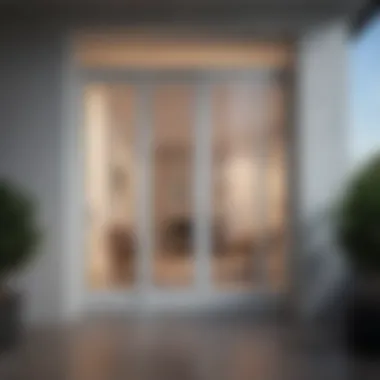

In summary, the functional advantages of French doors extend far beyond simple entry points. Their aesthetic appeal, space enhancement capabilities, and contribution to natural light make them a valuable addition to any home. Homeowners should consider these factors when contemplating designs that can fundamentally improve their spaces.
Impact on Property Value
The impact that good quality French doors can have on property value is significant. Homeowners consider many factors when they think about modifications to their homes. French doors serve not only as functional elements but also as features that enhance aesthetic value. The installation of quality doors can be a game-changer for the overall appeal of a property.
First, let us examine how the appearance of external and internal French doors plays a crucial role. Most prospective buyers look for homes that feel welcoming and elegant. Quality French doors can create an impression of luxury and openness. Moreover, they allow for greater visibility, connecting indoor and outdoor spaces. In this way, creating seamless transitions can attract buyers.
In addition to aesthetics, practical functionality cannot be overlooked. Quality French doors offer advantages such as improved access to natural light and ventilation. This can make a living space feel larger and more inviting, which is increasingly sought after in the real estate market.
Another consideration is that quality installations are usually associated with reputable brands and craftsmanship. When buyers see good French doors, they often assume other aspects of the home are equally well cared for. This perception can positively affect a buyer's willingness to pay a higher price.
"The installation of quality French doors enhances both beauty and functionality, making properties more attractive to potential buyers."
Market Trends
Understanding the prevailing market trends surrounding French doors can show their value in real estate. Currently, many homeowners and buyers prefer energy-efficient designs. Modern and sustainable materials are becoming popular due to their eco-friendliness. Brands focus on using materials like fiberglass and high-quality vinyl, which offer better insulation and durability.
The shift towards open-concept layouts in homes is also notable. This transition encourages the use of French doors to create flexible spaces that can serve multiple purposes. These trends signal that French doors can add a competitive edge to properties in today’s market.
In cities and suburban areas, outdoor living spaces are in demand. French doors promote the idea of outdoor access and enhance the experience of living spaces. They allow for easy movement to patios and gardens, making properties appealing to those looking for lifestyle versatility.
ROI Analysis
Return on investment (ROI) is crucial when considering enhancements like French doors. Real estate analysts report that quality exterior renovations, such as installing French doors, tend to offer significant returns. While the exact ROI may vary, studies show that homeowners can often recoup a large percentage of their investment when selling the home.
Investing in quality French doors can elevate a property’s market position. Potential buyers are often willing to pay more for homes that have existing high-quality features. When calculating ROI, it is also important to consider long-term value. Homes with quality installations generally have longer-lasting appeal, attracting buyers for years to come.
Installation Considerations
Pre-Installation Assessment
Before proceeding with the installation of French doors, a thorough pre-installation assessment is crucial. This step ensures that all elements align optimally for functionality and aesthetics. Homeowners should evaluate the door frame and surrounding walls for any issues that may affect installation. Measuring the rough opening correctly is an essential part of this assessment. Incorrect measurements can lead to poor fits, resulting in drafts or security concerns.
Another important aspect of the assessment is checking for level and square conditions of the existing structure. If the walls are uneven or the door frame is not plumb, complications may arise during installation. Homeowners are encouraged to take the time to prepare the area, clearing any obstructions and ensuring there is enough space for tools and materials required for installation.
Key aspects to consider include:
- Checking existing door frame dimensions.
- Confirming wall stability and alignment.
- Identifying any necessary repairs before the installation begins.
Professional Installation vs. DIY
Deciding between professional installation and a DIY approach involves weighing several factors. Hiring a contractor can offer peace of mind, especially for those unfamiliar with installation processes. Professionals bring expertise, tools, and experience, which may lead to a higher quality installation. They are also typically insured, providing an extra layer of security in case of accidents. Furthermore, they can often identify issues that may not be apparent to an untrained eye.
On the other hand, a DIY installation can be a cost-effective solution. For handy individuals, installing French doors can be a fulfilling project. It allows for complete control over the process and the opportunity to customize. However, it’s essential to acknowledge potential risks. Mistakes during installation can lead to significant issues down the line, such as improper sealing which can cause energy inefficiency.
Common Installation Mistakes
Even experienced installers can encounter challenges during the process of fitting French doors. Awareness of common mistakes can help mitigate risks and enhance the final results. Some prevalent errors include:
- Improper Measurement: Not measuring the door frame or door panel correctly can lead to gaps that reduce energy efficiency.
- Neglecting Weather Stripping: Failing to install weather stripping adequately can allow drafts and moisture to enter, leading to damage.
- Overtightening Hardware: This action can damage the door frame or warp the door, causing malfunction.
- Not Accounting for Settling: Skipping the consideration for the settling of the house over time can lead to doors becoming misaligned.
"Understanding the importance of installation considerations can save homeowners substantial time and costs in the long run."
By addressing pre-installation assessments, deciding on professional installation versus DIY, and being conscious of common mistakes, homeowners are better equipped to ensure their French doors are installed successfully, enhancing both their home's functionality and appearance.
Maintenance and Care
Maintaining French doors is vital for ensuring their longevity and functionality. Regular maintenance not only preserves the aesthetic appeal of the doors but also prevents costly repairs in the future. The investment in quality French doors deserves a commitment to their upkeep. This section discusses essential maintenance strategies and common issues that might arise over time.
Regular Maintenance Tips
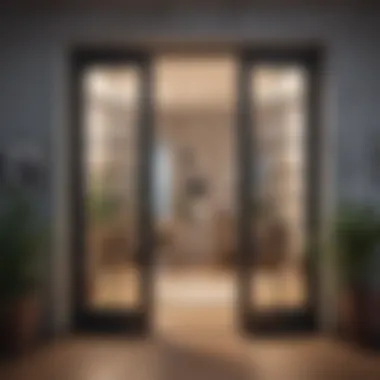

Effective maintenance practices can enhance the durability of French doors. These tips, though simple, bring great benefits:
- Routine Cleaning: Regularly clean the glass panels with a mild detergent. This helps maintain clarity and brightness, keeping the doors looking inviting.
- Check Seals and Weatherstripping: Inspect the seals around the doors. Damaged weatherstripping can lead to drafts and energy loss. Replacing it can improve efficiency significantly.
- Lubricate Hardware: Oil hinges and locks periodically. This prevents rust and ensures smooth operation of the doors.
- Paint and Stain Maintenance: If the doors are wooden, sanding and refinishing every few years keeps them protected from moisture and decay.
- Inspect Hardware: Regular examination of the locking and handle mechanisms can preempt future failures and assure security.
These practices are generally straightforward but can greatly extend the life of your French doors. Caring for them ensures they remain a beautiful and functional part of your home.
Common Issues and Solutions
As with any home feature, issues can arise with French doors. Being aware of potential problems and their respective solutions is crucial for keeping the doors in good shape.
- Warping or Swelling: High humidity or extreme temperature changes can cause wooden doors to warp. If this happens, adjustments to the hinges or replacing them may be necessary.
- Glass Breakage: While durable, glass can break due to impact. If cracks occur, call a professional for replacement. DIY attempts can be dangerous.
- Drafts or Leaks: If you notice cold air entering or water pooling, check the seals. Old or damaged seals need replacement to ensure energy efficiency.
- Difficulty Opening or Closing: This may be a sign of misalignment or swelling. Realigning the doors or adjusting the hinges can resolve these issues.
Keeping your French doors well-maintained not only protects your investment but also enhances the comfort and safety of your home.
By paying attention to these common issues and implementing regular maintenance, homeowners can ensure their French doors serve them well for many years. This approach highlights the importance of investing in quality materials and results in enhanced value and aesthetic appeal.
Energy Efficiency
Energy efficiency is a crucial element when it comes to selecting French doors. Homeowners today are more conscious about their energy consumption. Energy-efficient doors contribute not only to reduced utility bills but also to the overall comfort of a home. They are designed to minimize heat loss in winter and keep interiors cool during summer months. This feature is particularly important for regions with extreme temperature variations.
Insulation Properties
The insulation properties of French doors are paramount. High-quality doors typically use advanced materials and technologies to ensure a snug fit that prevents drafts. Look for options that have multiple layers, including insulated glass and thermal breaks. These elements work together to create a barrier against external temperatures. As a homeowner, investing in well-insulated French doors can lead to significant long-term savings. Moreover, they can enhance your living space's acoustical insulation by reducing noise from the outside.
Impact on Heating and Cooling Costs
The impact of French doors on heating and cooling costs cannot be overstated. By effectively sealing the internal environment, these doors can drastically reduce the reliance on heating and air conditioning systems. This efficiency translates into reduced energy bills, which can be a considerable relief for many households. Moreover, a well-installed and energy-efficient French door can lower the carbon footprint of a home.
"Energy-efficient homes not only save money but also contribute to a sustainable future."
When choosing French doors, consider their Energy Star rating. Doors with this certification have met specific guidelines for energy efficiency. Pairing high-quality French doors with good insulation practices can further enhance savings. Simple actions like closing shades or curtains can also help maintain indoor temperatures, maximizing the benefit of your energy-efficient doors.
In summary, prioritizing energy efficiency when selecting French doors can greatly enhance the comfort of your home and keep energy costs manageable. It is a wise investment for the conscientious homeowner.
Trends in French Door Designs
In recent years, French doors have undergone significant transformations in design to cater to changing aesthetics and functional needs. Understanding these trends is crucial for homeowners and interior design enthusiasts. The visual appeal of a home is greatly enhanced by well-chosen doors. Therefore, continually evolving styles reflect current tastes, architectural considerations, and environmental awareness.
Contemporary Styles
Contemporary styles of French doors focus on clean lines and simplicity. They often incorporate large glass panels that flood interiors with natural light while maintaining minimalistic frames. Homeowners are increasingly opting for this look to create a seamless transition between the indoor and outdoor spaces. The materials used in contemporary French doors typically include aluminum and fiberglass, known for their durability and low maintenance.
Another exciting trend is the inclusion of bold colors and finishes. Instead of traditional white, homeownwers can experiment with deep blues, forest greens, and even matte black. This approach not only stands out but also allows buyers to express their personality through their choice of doors. The mix of materials, such as combining wood with metal frames, also adds an innovative edge, satisfying both aesthetic demands and functional durability.
Sustainable Materials Usage
Sustainability has become a pivotal trend in French door designs. More homeowners prioritize eco-friendly materials that minimize environmental impact. This shift is notable as manufacturers develop products made from reclaimed wood, recycled glass, and sustainable composites. These options offer the same aesthetic strengths as traditional materials while promoting green building practices.
Using sustainable materials often implies a longer lifespan for doors. For instance, recycled aluminum and fiberglass are resistant to warping and weather-related damage. This robustness translates to lower maintenance and replacement costs over time, appealing to budget-conscious homeowners.
Moreover, many modern French doors now come with energy-efficient glazing. This helps regulate indoor temperatures and reduces energy costs. By integrating sustainable practices into the design process, homeowners not only enhance their spaces but also invest in their environmental future.
"Choosing sustainable materials for home improvements can significantly reduce the carbon footprint while enhancing the overall beauty of a property."
Ending
In closing, the significance of selecting good quality French doors cannot be overstated. Beyond their aesthetic contribution, these doors serve functional roles that enhance both the interior and exterior of a home. They facilitate greater natural light, expand sightlines, and create a seamless transition between indoor and outdoor spaces. This functionality adds to the overall appeal, making properties more inviting and adaptable for various uses.
Recap of Key Points
- Aesthetic Appeal: Quality French doors offer an elegant visual that can elevate the look of any home style, whether it embraces modern or traditional designs.
- Functional Advantages: These doors not only connect spaces but also improve ventilation and light flow, promoting a healthier living environment.
- Market Value: They often boost property values, providing a return on investment that many homeowners appreciate.
- Maintenance Needs: Regular care is necessary to preserve their quality, with various materials offering different levels of durability and upkeep.
- Energy Efficiency: Proper insulation can lead to significant savings on heating and cooling costs, making energy-efficient models a practical choice.
- Trends: Keeping abreast of design trends ensures that your choice of French doors does not only suit current tastes but also harmonizes with your home's aesthetic.
Future Considerations
As homeowners continue to seek ways to enhance their living spaces, the demand for quality French doors is likely to grow. Future designs may emphasize sustainability more, incorporating eco-friendly materials and energy-efficient technologies. Homeowners should also be informed about advancements in security features for these doors. Moreover, as urban living spaces become more compact, the need for effective light enhancement and garden access will further drive the popularity of quality French doors.
"Selecting the right French doors is an investment in both style and functionality, significantly affecting the ambiance of a home."
Remaining aware of these factors will help homeowners make informed decisions that align with both their aesthetic goals and practical requirements. This comprehensive understanding will serve them well in the ongoing evolution of home design and improvement.







